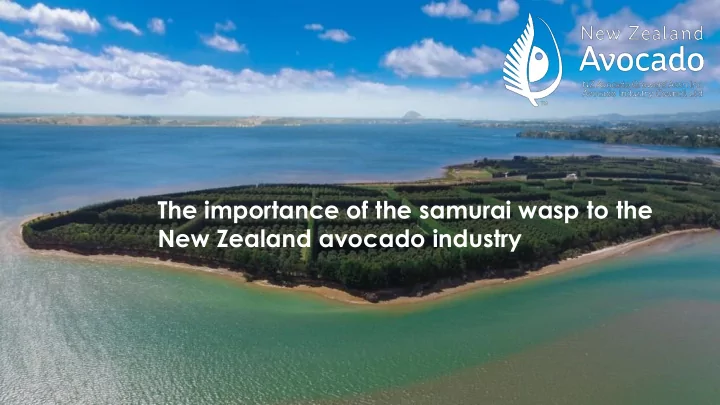

The importance of the samurai wasp to the New Zealand avocado industry
Increasing industry value
The NZ avocado industry… 1842 orchards Export season Over 4000 ha Aug. – Mar. Avocados flower in Spring (October) and 2016-17 3 oil companies 14 packhouses fruit hang on the tree for over a year 1 processor Record 7M tray crop Without the ability to coolstore, fruit is $200m industry left exposed to pests and the resulting control measures for extend periods 11 exporters 4 + Nurseries No sprays are applied over flowering or 3 industry gene blocks close to harvest
There are always two generations of fruit on the tree meaning there are few times to apply broad spectrum insecticides There are no label claims for Bifenthrin for avocados
A highly refined and evolving pest management programme contributes to market access and premium returns • Compliance with AvoGreen is a mandatory requirement for the export of avocados • AvoGreen pest monitoring both justifies spray use and is required for market access • This highly refined IPM programme balances crop protection with environmentally responsible spray use
• Our industry can’t compete internationally on volume but we do on quality, food safety and provenance • The economic viability of the industry is dependent on the premium price found in export markets • Any extraordinary agrichemical use that disrupts our refined IPM programmes can significantly undermine that advantage • Without environmentally sustainable long-term pest control options, growers may suffer both crop loss and loss of value through reduced market access opportunities
BMSB control options are very limited Broad-spectrum chemicals are not effective in reducing highly motile BMSB populations both.. • During summer, when they are highly dispersed throughout the environment, and • During winter when they take refuge within buildings and public structurers These challenges are compounded by the lack of effective monitoring tools or technology to find, quantify and target BMSB populations With such a wide host range, populations of BMSB will readily re-infest crops after spraying No other feasible control options exist for the avocado industry (like exclusion netting) More aggressive agrichemicals increases the risk of once naturally controlled secondary pests becoming more damaging or developing increased levels of chemical resistance Impacts would be felt through the whole value chain including the costs to research and install new technology post harvest for sorting affected fruit
The Samurai wasp is internationally recognised as the most effective parasitoid for BMSB and remains the primary candidate for biocontrol in countries already dealing with established BMSB populations Without the Samurai wasp the chances of ever managing this pest alongside a successful horticulture sector are significantly reduced “BMSB is going to be a much bigger issue than most people realize. It is already costing some of our fruit industries millions of dollars annually” Timothy Spann, Ph.D Research Program Director, California Avocado Commission
NZ Avocado strongly support the application Due to: • The high likelihood of BMSB arrival and establishment; • Its likely impact on the horticulture industry as well as New Zealand’s public, native flora and potentially tonga species; • Limited surveillance and no feasible control options for BMSB
Questions
Japan USA Singapore S Korea Thailand Malaysia Australia
Recommend
More recommend